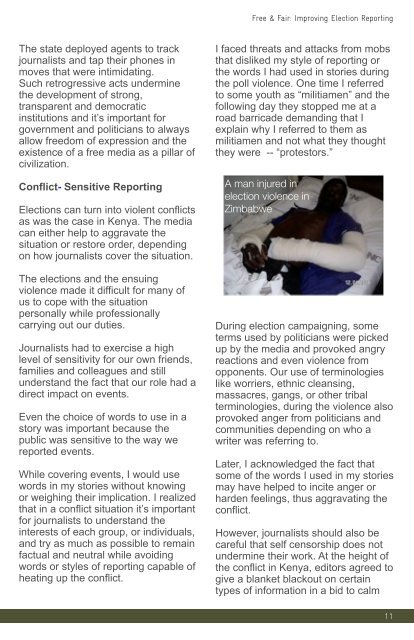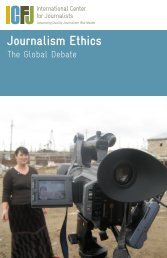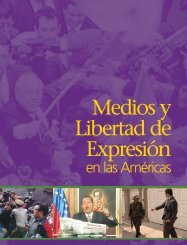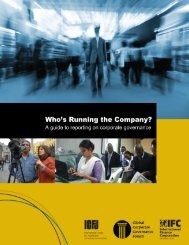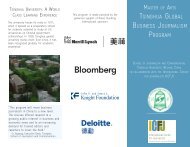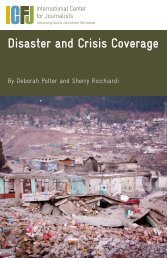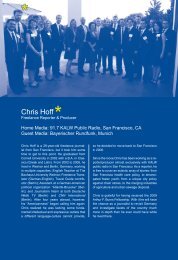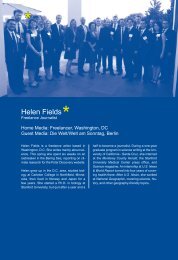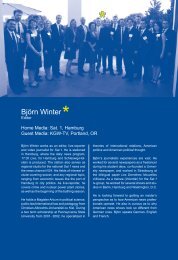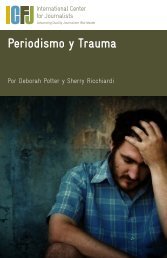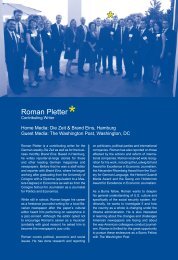Download PDF - International Center for Journalists
Download PDF - International Center for Journalists
Download PDF - International Center for Journalists
Create successful ePaper yourself
Turn your PDF publications into a flip-book with our unique Google optimized e-Paper software.
Free & Fair: Improving Election Reporting<br />
The state deployed agents to track<br />
journalists and tap their phones in<br />
moves that were intimidating.<br />
Such retrogressive acts undermine<br />
the development of strong,<br />
transparent and democratic<br />
institutions and it’s important <strong>for</strong><br />
government and politicians to always<br />
allow freedom of expression and the<br />
existence of a free media as a pillar of<br />
civilization.<br />
Conflict- Sensitive Reporting<br />
Elections can turn into violent conflicts<br />
as was the case in Kenya. The media<br />
can either help to aggravate the<br />
situation or restore order, depending<br />
on how journalists cover the situation.<br />
The elections and the ensuing<br />
violence made it difficult <strong>for</strong> many of<br />
us to cope with the situation<br />
personally while professionally<br />
carrying out our duties.<br />
<strong>Journalists</strong> had to exercise a high<br />
level of sensitivity <strong>for</strong> our own friends,<br />
families and colleagues and still<br />
understand the fact that our role had a<br />
direct impact on events.<br />
Even the choice of words to use in a<br />
story was important because the<br />
public was sensitive to the way we<br />
reported events.<br />
While covering events, I would use<br />
words in my stories without knowing<br />
or weighing their implication. I realized<br />
that in a conflict situation it’s important<br />
<strong>for</strong> journalists to understand the<br />
interests of each group, or individuals,<br />
and try as much as possible to remain<br />
factual and neutral while avoiding<br />
words or styles of reporting capable of<br />
heating up the conflict.<br />
I faced threats and attacks from mobs<br />
that disliked my style of reporting or<br />
the words I had used in stories during<br />
the poll violence. One time I referred<br />
to some youth as “militiamen” and the<br />
following day they stopped me at a<br />
road barricade demanding that I<br />
explain why I referred to them as<br />
militiamen and not what they thought<br />
they were -- “protestors.”<br />
A man injured in<br />
election violence in<br />
Zimbabwe<br />
During election campaigning, some<br />
terms used by politicians were picked<br />
up by the media and provoked angry<br />
reactions and even violence from<br />
opponents. Our use of terminologies<br />
like worriers, ethnic cleansing,<br />
massacres, gangs, or other tribal<br />
terminologies, during the violence also<br />
provoked anger from politicians and<br />
communities depending on who a<br />
writer was referring to.<br />
Later, I acknowledged the fact that<br />
some of the words I used in my stories<br />
may have helped to incite anger or<br />
harden feelings, thus aggravating the<br />
conflict.<br />
However, journalists should also be<br />
careful that self censorship does not<br />
undermine their work. At the height of<br />
the conflict in Kenya, editors agreed to<br />
give a blanket blackout on certain<br />
types of in<strong>for</strong>mation in a bid to calm<br />
11


